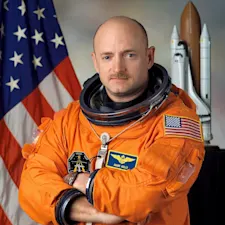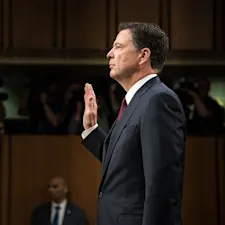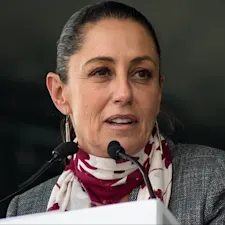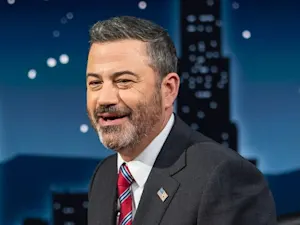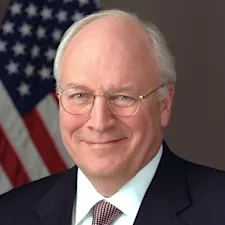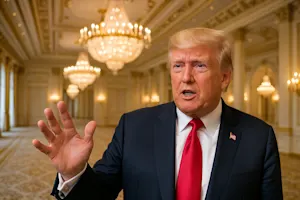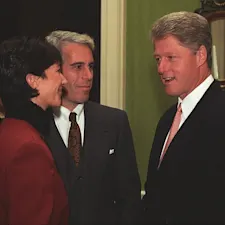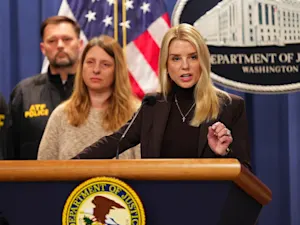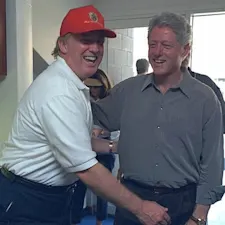
McConnell Sounds Alarm: 'Most Dangerous Period' Since 1930s
Mitch McConnell, 2023. Photo courtesy of Drew Angerer under CC BY-SA 4.0.
The world is watching a political drama unfold that some say echoes the darkest days before World War II. In a wide-ranging interview with the Lexington Herald-Leader, outgoing Senate GOP leader Mitch McConnell issued a stark warning about the dangers lurking in the current global landscape. He described Donald Trump's second term as the "most dangerous period since before World War II," according to The Daily Beast — drawing chilling parallels to the isolationist policies of the 1930s and highlighting the growing threats posed by authoritarian regimes like China, Russia, Iran, and North Korea.
A History-Haunted Warning
McConnell's comments come as a veteran institutionalist sounding the alarm on what he sees as a perilous moment in history. According to The Daily Beast, he compared the Trump administration's fixation on trade tariffs to the Smoot-Hawley Tariff Act of 1930, legislation widely blamed for deepening the Great Depression and hastening global conflict. The senator warned that the echoes of the 1930s isolationism, with its "America First" rhetoric, are dangerously familiar today. This nationalist stance, McConnell suggests, risks leaving the United States unprepared to face the complex challenges posed by a coalition of hostile powers.
The 1930s were marked by economic turmoil and a reluctance to engage with rising threats abroad. McConnell's comparison is a sobering reminder that history can repeat itself if lessons are ignored. The senator pointed to the gathering of authoritarian leaders in Beijing, including Russia's Vladimir Putin, China's Xi Jinping, and North Korea's Kim Jong-un, as a sign of a shifting global balance of power that the U.S. must confront with resolve.
The Threats on the Horizon
McConnell singled out several nations as emblematic of the current dangers. "North Korea, China, Russia, Iran and Iran's proxies. They're very different kinds of countries, but they have one thing in common: They hate us," McConnell said, according to The Guardian. These countries represent very different regimes but are united in their opposition to American influence. The senator expressed concern that the U.S. is not adequately prepared to meet these challenges, especially in light of ongoing conflicts like Russia's invasion of Ukraine, which has become the largest war in Europe since World War II, as reported by The Guardian.
The senator's focus on defense and foreign policy has intensified since stepping down from his leadership role. He emphasized the importance of avoiding a scenario where Russia emerges victorious in Ukraine, warning of the far-reaching consequences such an outcome would have for global stability. McConnell also highlighted the financial benefits of U.S. support for Ukraine, saying, "For those who are concerned about the money, I think it's important to remember that about half of the money was spent in this country, including in Kentucky, [with] 38 states modernizing our own industrial bases," as reported by The Guardian.
A Clash of Visions Within the GOP
McConnell's warnings come amid a complex relationship with President Trump and his "MAGA" doctrine. While McConnell reportedly worked with Trump on key initiatives during the first term, including tax cuts and judicial appointments, he has been critical of the administration's trade policies and approach to foreign affairs. His stance on bolstering military strength and maintaining global leadership contrasts with Trump's more isolationist tendencies.
As McConnell prepares to assume the chairmanship of the Senate Appropriations Subcommittee on Defense, he is positioned to influence defense spending at a critical time. He has framed America's national security challenges as the gravest since World War II, underscoring the need for a strong military to deter adversaries. This role also places him at the center of debates over election administration and Senate procedures, areas where he has long been active.
Lessons From the Past, Warnings for the Future
The senator's reflections serve as a cautionary tale about the dangers of shortsighted nationalist policies. The isolationism of the 1930s, which McConnell referenced, is widely regarded by historians as a factor that allowed authoritarian regimes to gain strength unchecked. By drawing this parallel, McConnell is urging a more engaged and prepared American stance on the world stage.
His remarks also highlight the tension within the Republican Party between traditional institutionalists and the more populist, nationalist wing represented by Trump and his allies. McConnell's emphasis on "peace through strength" and global leadership contrasts with the inward-looking policies that have gained traction in recent years, as reported by the Associated Press.
The Weight of Legacy
As McConnell nears the end of his Senate career, his legacy is intertwined with the turbulent political era he has helped shape. He played a pivotal role in shaping the Supreme Court's conservative majority and has been a key figure in Republican strategy for decades. Yet, his recent warnings suggest a desire to be remembered as someone who sought to protect the country from the very dangers that have emerged during this period.
The senator declined to definitively say whether the U.S. is in a better position now than before the Trump era, noting that not enough time has passed to fully evaluate the impact. Still, he expressed hope that history will judge his efforts as having an "impact in a positive way on the country," as reported by The Guardian.
What You Need to Know
If you are following the shifting tides of American politics and global affairs, McConnell's warning is a signal to pay attention. The echoes of the 1930s isolationism and the rise of hostile powers abroad are not just history lessons but urgent calls to action. Whether the U.S. can navigate this "most dangerous period" successfully depends on choices made in Washington and beyond. The stakes have never been higher.
References: Trump's second presidency is 'most dangerous period' since second world war, Mitch McConnell says | Mitch McConnell | McConnell to head subcommittee overseeing defense spending as he prepares to step down as GOP leader | Mitch McConnell's Warning: 'Most Dangerous Period' in Almost 100 Years







